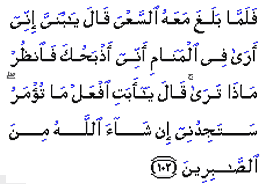Celebrated Event!, 10 days of Zul Hijjah, Fasad, Resources
Issue 207 » January 31, 2003 - Zul-Qada 29, 1423
General
Al-Saffat
(The Ranks) Commentary: The Most Celebrated Event! One of the most celebrated events of Abraham's life is the encounter with his son, Ishmael (Ismail), who had been born during Abraham's old age. As the boy grew before his father's proud eyes, God, in His wisdom, ordered Abraham to slay his son as an offering to Him. One could imagine Abraham's predicament: a father ordered by God to sacrifice one of his most precious possessions in the world, the son he treasured and loved. Were the son to have been harmed in any other way the father would have been stricken by grief, so how deep his distress must have been when he was the one ordered to kill him! Abraham, being the loyal and obedient servant and messenger he was, could not imagine ignoring an order from his Lord and so he told his son what was required of him. The son, being a truthful and pious believer, responded by saying:"Father do as you are bidden. God willing you shall find me steadfast." The moment arrives when both would give themselves up to their respective fates. As the father takes out the blade and puts it to the son's throat, they are both rescued by God. It was indeed a bitter test and God rewarded Abraham by ransoming Ishmael with a noble sacrifice and bestowed upon Abraham peace for all generations to come. This is another example that God's testing of mankind is grave and extensive, and the true faith is more than mere lip service, but entails perseverance and total submission to God. [Compiled from "A Thematic Commentary on the Quran" by Shaikh Muhammad Al-Ghazali, pp 491-492] |
Things to do during the first 10 days of Zul Hijjah While any good deed done for the sake of Allah according to the way He approves will be rewarded immensely during the first ten days, Insha Allah, some of the more specific actions mentioned in the Traditions of the Prophet are fasting and verbal Zikr (remembrance) of Allah. In terms of fasting, it is particularly encouraged to fast on the ninth day of Zul-Hijjah, known in Arabic as Yawm Arafa. The Prophet used to fast on this day (al Nisai and Abu Dawud). Fasting on this day will expiate a Muslim's sins for two years. The verbal remembrance of Allah is another meritorious act during these first ten days of Zul Hijjah. The Prophet upon him) encouraged Muslims to recite a lot of Tasbeeh ("Subhan-Allaah"), Tahmeed ("Al-hamdu Lillaah") and Takbeer ("Allahu akbar") during this time. The Takbeer may include the words "Allahu akbar, Allahu akbar, la ilaha ill-Allah; wa Allahu akbar wa Lillahi’l-hamd (Allah is Most Great, Allah is Most Great, there is no god but Allah; Allah is Most Great and to Allah be praise)," as well as other phrases. Men are encouraged to recite these phrases out loud and women quietly. Ibn ‘Umar and Abu Hurayrah, two of the Prophet's Companions, used to go out in the marketplace during the first ten days of Zul-Hijjah, reciting Takbeer, and the people would recite Takbeer individually when they heard them. Generally, all good deeds are rewarded highly at this blessed time. These actions include praying, reading Quran, making Dua (supplication), giving in charity and being good to our families. In addition, seeking Allah's forgiveness at this time is also encouraged. This means more than just a verbal expression of sorrow for past misdeeds. It also requires a firm resolution to avoid making the same mistakes in the future by giving up bad habits and behavior while sincerely turning to Allah. [Taken from The first 10 days of Zul Hijjah: Syed Abul Ala Maududi] |
Some helpful links to know more about Hajj |
Fasad Fasad, literally 'corruption', in Quranic terminology, means creating disorder and corruption on earth by following a path other than God's. Islam maintains that true peace and happiness emanate only through the observance of God's commands and through making a conscious effort to see that His laws alone are implemented in every sphere of life. Fasad occurs when man violates God's laws and disobeys Him. Fasad may therefore be partial as well as total; partial when one disregards God's law in one aspect of life while acknowledging His sovereignty in other spheres. If a society is based on the denial of God, that society is bound to be a corrupt and exploitative society - hence full of fasad. [Taken from SoundVision.com's "Glossary of Islamic Terms"] |
